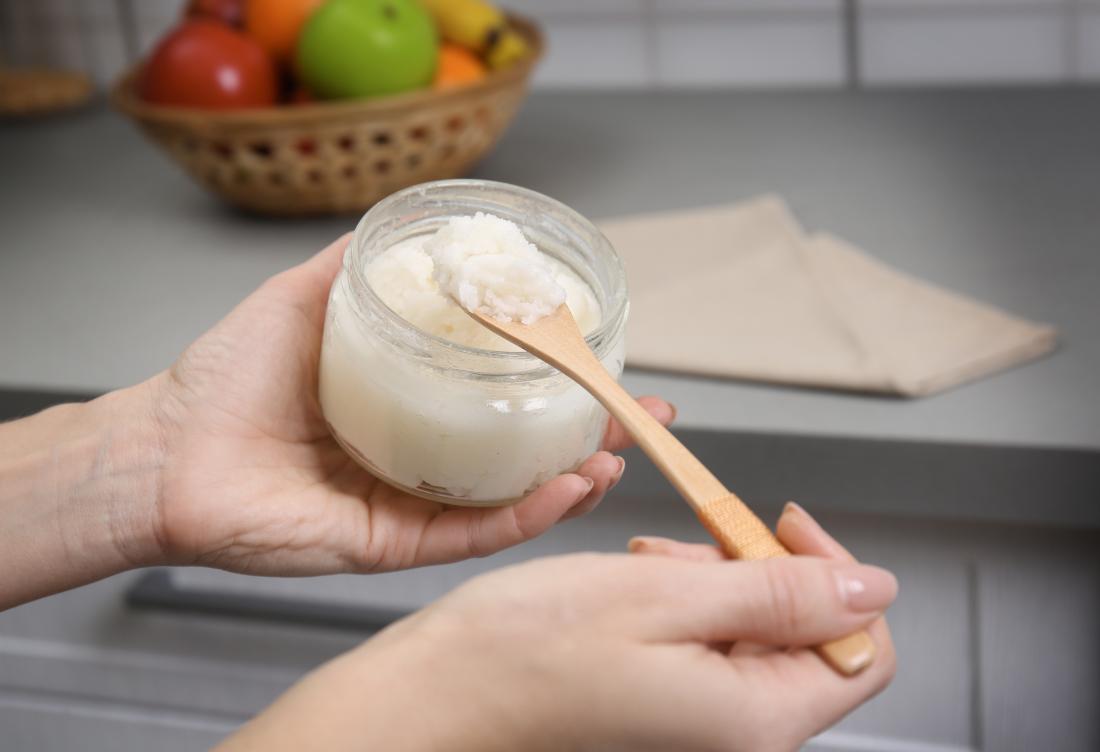The process of churning milk or cream separates the milk fat from the liquid. The remaining fat becomes the butter.
However, some people choose to avoid butter for reasons including:
- its high saturated fat content
- they have an intolerance to casein, the main protein in milk products
- they have a lactose intolerance
- they have made a dietary choice such as veganism
In this article, learn about a variety of butter alternatives for use in baking, cooking, and spreading.
1. Olive oil

A person can use olive oil instead of butter when sautéing vegetables and meat.
People use olive oil in many Mediterranean recipes. For any recipes that require cooking on the stove top, a person can often swap butter for olive oil when sautéing vegetables and meat. It is best to use a little less olive oil compared with butter for this purpose.
Olive oil is not always a good substitute for baking, however. Many baked goods require the fat to remain a solid or return to a solid as they cool. However, people can make some baked goods, such as pancakes, with olive oil.
The main type of fat in olive oil is monounsaturated fat, which may have some health benefits that the saturated fat in butter does not have.
Research from 2014 found that consuming olive oil regularly could reduce the risk of cardiovascular disease and mortality in individuals at high cardiovascular risk.
Other benefits of monounsaturated fat include lowering cholesterol and improving blood sugar control.
However, like butter, olive oil is a calorie-dense food. For this reason, people should consume it in moderation.
2. Ghee
Ghee is a clarified butter with a distinctive nutty taste and aroma. Like coconut oil, a person can replace butter with ghee at a 1-to-1 ratio in cooking and baking.
However, in some recipes, a person may need to alter the amount of ghee, as it contains more moisture than butter. Ghee works best as a butter substitute in baked goods that require cooking at higher temperatures.
3. Greek yogurt
Greek yogurt is a high-protein substitute for butter suitable for use in many baking recipes. It may add some tanginess to the recipe.
A person should look for full-fat yogurt to help keep baked goods moist. Nonfat yogurt may result in a drier, more crumbly finished product.
4. Avocado
Avocado is a nutritious alternative to butter. Not only can adding avocado increase the overall nutritional value of a meal or baked good, but it can also substitute butter’s saturated fat for monounsaturated fat.
5. Pumpkin purée
With plenty of vitamin A and other nutrients, pumpkin purée can replace butter in most recipes.
However, pumpkin purée is more watery than some of the other options on this list, so a person should use about three-quarters of the amount they would use for butter.
6. Mashed bananas
Similar to pumpkin purée, bananas add nutrients and increase the overall nutritional content of the food without the added fat.
However, bananas may add sweetness and a distinct flavor to some recipes.
7. Coconut oil

Coconut oil is a suitable alternative to butter in all baking.
Unlike olive oil, which may not be suitable for use in all baked goods, coconut oil is a good butter substitute because it returns to a solid state at room temperature.
Coconut oil has a distinct taste, however, which could alter the taste of many baked goods. In general, the more refined the coconut oil is, the less it tastes like coconut.
While it is a good alternative for those looking to avoid dairy, coconut oil may offer few additional health benefits.
A 2016 review of several studies found limited evidence to suggest that coconut oil can actually offer any health benefits. In fact, the researchers suggest that people looking to reduce their fat intake avoid foods that list coconut oil as a major ingredient.
8. Applesauce
Applesauce is a popular substitute for both butter and oil in baking. Like many other substitutes, it can cut calories and increase the nutritional content of many recipes.
When using applesauce as a butter substitute, a person can reduce other sweeteners in the recipe because applesauce adds natural sweetness.
9. Nut butter
There are many varieties of nut butter, including those derived from almonds or peanuts. Similar to avocados, nut butters add healthful fat and nutrients to recipes.
Nut butter may increase the density of certain baked goods and may change their flavor.
Summary
Butter substitutes can often increase the nutritional value of the foods people use them in. In some cases, they can reduce calories and add healthful fats.
Butter substitution is not always practical, as a person may need to adjust the quantity of the replacement to get the correct texture and density while baking.
However, people looking to make healthful choices may wish to consider butter alternatives when cooking, baking, and spreading.
